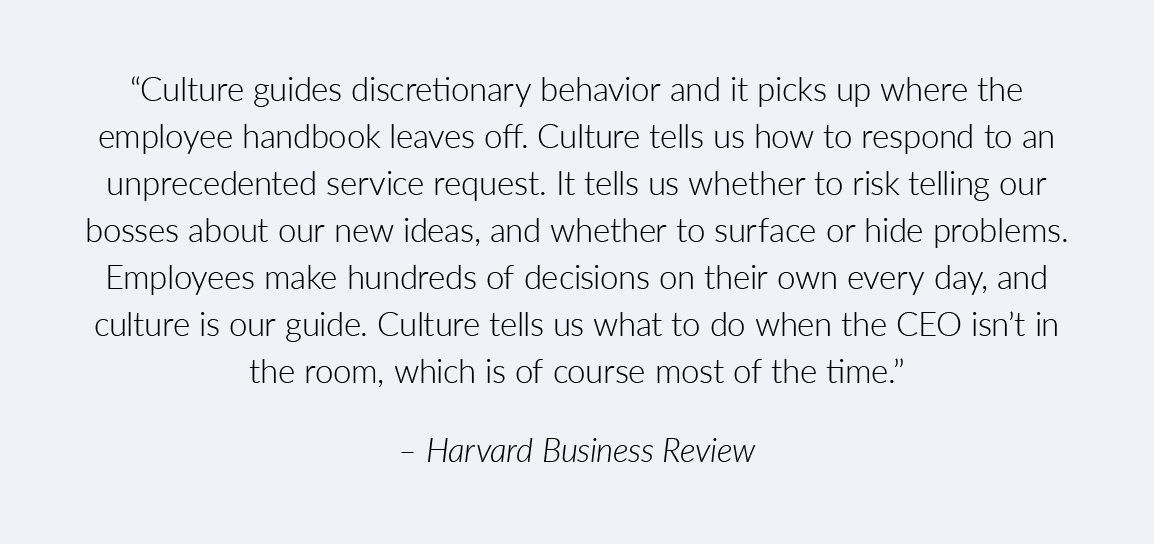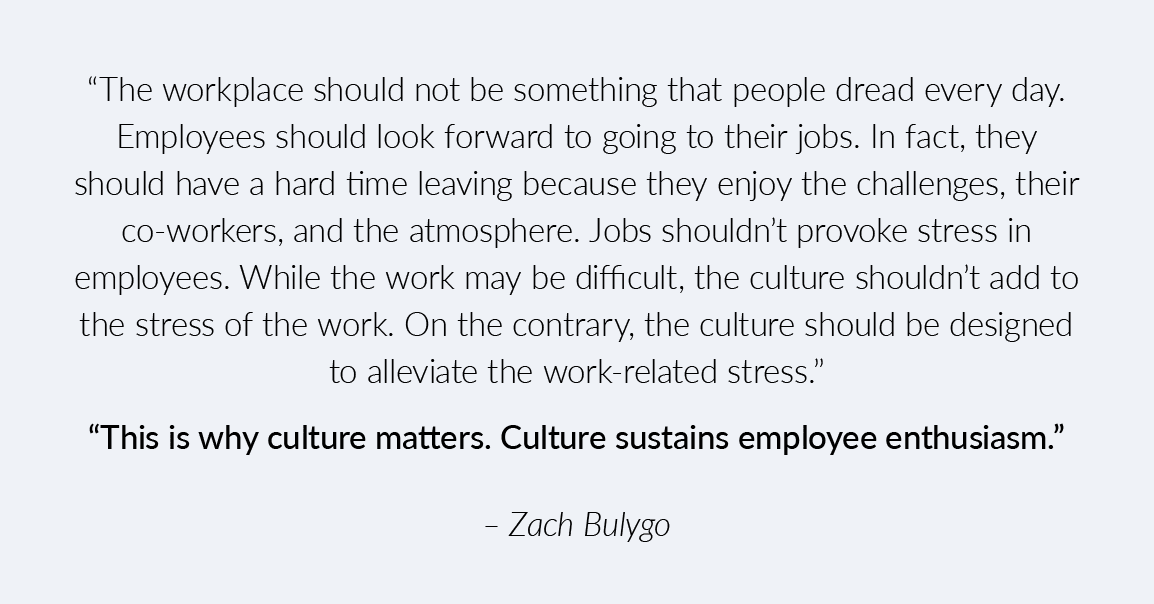Culture seems to be the latest business buzzword and “must-have” in companies today. But what exactly is culture? How can you have a great one that recruits and retains an excellent workforce? How can a healthy, thriving culture impact your bottom line? We’ll cover the basics of cultivating an excellent company culture this month on ‘Powered by Creativity.’

Every company has a distinct culture, no matter if they have one employee or hundreds of thousands. Company culture involves what employees see, feel, and think about your business – it is a set of visions, values, norms, beliefs, habits, and assumptions that make up your company’s identity; in essence, it is your company’s personality. Cultures are not something employees bring with them; they are ingrained in the genetic code of your company and will exist before and after employees come and go, although they can change over time.

To evaluate your company’s current culture, you may want to ask yourself these questions: “What are common behaviors of employees while they are on the job – good or bad? How meaningful is the job to my employees – would they go elsewhere if given the opportunity?” While not your actual culture, the answers to these questions signify either a healthy or unhealthy culture. Company culture is important to employees and employers alike – employees want to enjoy their time in the workplace and feel that their work has meaning for both themselves and the company, while employers benefit when they have employees who fit in with the company culture, which usually makes them happier and more productive, as well as wanting to work for the company longer.

The good news is that, if you have discovered aspects of your culture that you would like to improve upon, they are fluid and changeable. Putting a focus on culture within your company gives your team guiding principles. It is up to the leaders of the company to set the precedent for the culture you want to achieve. According to companyculture.com, 80% of company members are potentially very flexible – if the culture asks for employees to be engaged, responsible, pleasant, and highly productive, they will be; however, in unhealthy culture environments, employees may be closed, unengaged, irresponsible, unpleasant, and unproductive.

If you cultivate a great culture, people will know you for it, your team will live by it and work together towards the same company mission, and it will get you through the bumps in the road. Here are a few key areas you can get started with right away to get the ball rolling on creating a dynamic company culture.
Purpose: In order for your purpose to be effective and resonate with your team, they not only have to be told what it is, they have to buy into it as well. Employees as a whole typically want to feel like what they do matters – showing them their measurable impact on the success of the company makes them invested in what they do and want to do better.
Engagement: Purpose’s cousin, engagement, is all about preparation – specifically how prepared your employees feel to fulfill their purpose. If there are distractions or inefficiencies, or people don’t feel like they can fulfill their role to the best of their ability, there is an engagement problem.
Trust: A critical aspect in life that transfers into the workplace, trust needs to be an important company value, period. If there is mistrust about your employees, whether it comes to personal effects or getting the job done, the issue needs to be addressed and rectified as soon as possible.
Evolve: Continuous learning = continuous improvement of your company. Processes and the way things are done change and evolve over time, and so should your workforce. It is the responsibility of the business owner to make sure employees feel empowered to seek their own continuing education, and if they don’t, you need to dig a little deeper into finding out why.

Culture matters – a healthy culture creates enthusiasm and happiness, which means more productivity. Job satisfaction starts with job creators caring about their employees. When an employer hires that perfect candidate, they definitely want the best return on their dollar, but if you ask the reverse question ‘besides a paycheck, what are your employees getting out of their job?’ it may help you understand how to engage and motivate employees to their full potential. Improving company culture may seem like it takes a lot of effort, but once you have a healthy one, the benefits are countless; from getting more work done faster to higher retention rates of valuable members of the team, as well as eventually being able to recruit the most competitive employees to keep your company moving forward. The best and brightest employees in any given field want it all; competitive salary and benefits, work/life balance, and a great company culture that makes them look forward to going to work every day. In turn, they’ll give you their best and be invested in your company’s success as much as you are.
If you’re reading this and feel like you don’t know where to begin with changing your company culture for the better, you’re not alone. Company culture is unique to each business and can sometimes be a complicated aspect of your company to change. If you’re ready to make that leap, our culture experts are here to help with solid advice and business development plans. We have the unique perspective of being on the outside looking in, and may be able to pinpoint certain pain points in your culture that are easy to overlook when you are busy running your day-to-day operations. Give us a shout out today – we’d love to talk to you!
